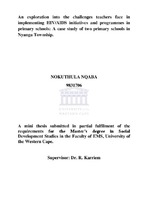| dc.description.abstract | Twenty years into democracy and South Africa like many of the world‟s nations still faces manifold challenges in dealing with HIV/AIDS. This disease affects millions of people in various forms; socially, economically and politically. HIV/AIDS is considered to be a global pandemic (UNAIDS, 2011). The largest group at risk appears to be people between the ages of 15 and 24. One crucial way of dealing with this pandemic is through education since the emphasis is on prevention. It is against this background that this study explored the challenges teachers face in implementing HIV and AIDS initiatives and programmes in two primary schools in Crossroads, in the Nyanga region, in the Western Cape. It appears that research on this topic is not normally carried out in primary schools. I therefore start from the premise that literature on the topic, especially in this empirical field (primary schools), is limited. The conceptual lens used to understand this complex issue is the Bio-ecological Systems Model of Bronfrenbrenner (1977). Teachers operate within various contexts and their teaching is often influences by their experiences, knowledge and attitudes (Tayob, 2010:3). Furthermore, it appears that the implementation of HIV/AIDS initiatives and programmes at primary school level is dependent on the relationship between many systems. The complexities of understanding these relationships warrant the use of this model within this study. Methodologically, this study employed a qualitative case study research design to investigate this contemporary phenomenon. I employed in-depth qualitative data collection procedures which included: a questionnaire, semi-structured interviews, and document analysis. The findings indicate that educators are seriously constrained by lack of support from school management and parents when engaging in HIV/AIDS initiatives or programmes at respective primary schools. The study also reveals that educators are not well trained to offer counselling to deal with HIV/AIDS related matters and it becomes worse with those infected. In addition, this study reveals that embedded cultural beliefs play a huge impeding factor in attempts to participate in HIV/AIDS initiatives and programmes, which are aimed to empower both educators and learners. The study therefore recommends a need for stronger financial muscle and support from schools management team to ensure that time set aside for life orientation classes be utilised effectively for the benefit of learners with priority on HIV/AIDS studies and initiative programmes. A strategic inclusion of parents, religious and traditional leaders with the Department of Basic Education and all relevant partners is very critical to achieve the fight against the struggle with HIV/AIDS through means of education at all levels within the sector and beyond. | en_US |

